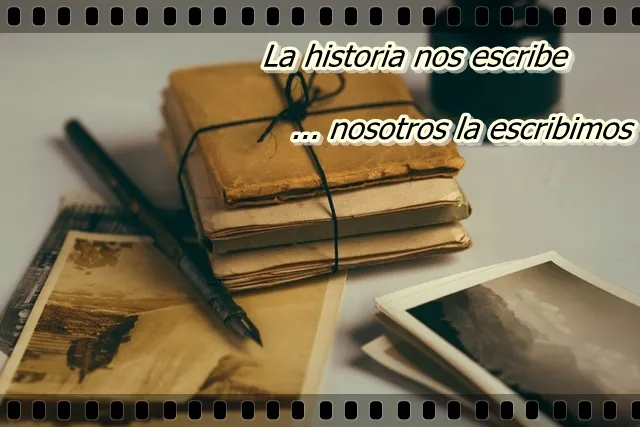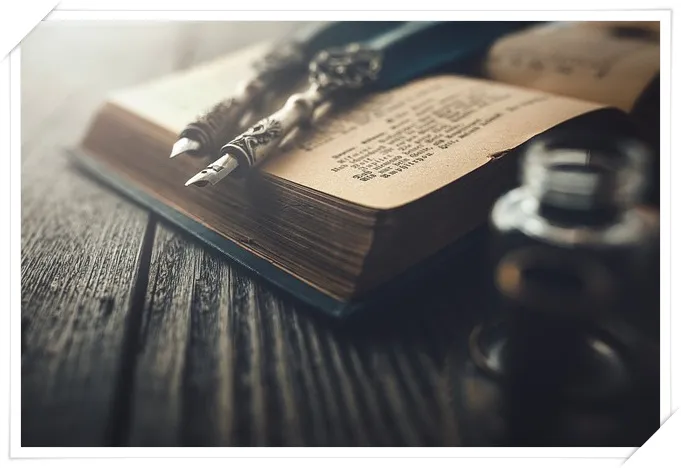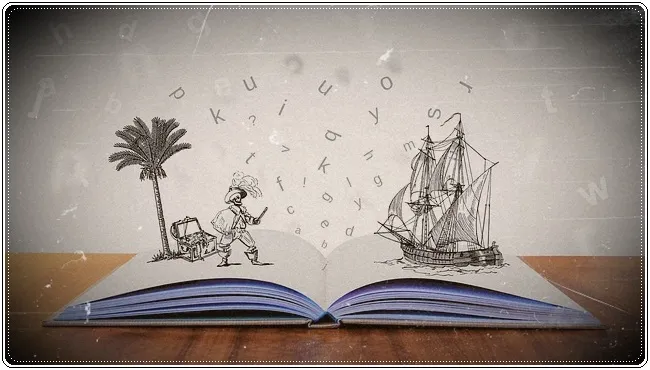
Source
La historia nos escribe
This week's initiative of the humanitas community is about the history and since I consider it ( and it is!) a fundamental topic, I do not want to miss the opportunity to leave some reflections on it. It is well known the saying: "History is mother and teacher", which is not only a nice phrase but the fair recognition that we must give to the events along with the human evolution since these in different weights and measures influence it.
Writing these lines comes to my mind the series of Pablo Escobar directed by the Colombian television "Caracol", which at the beginning of each episode also brings a sentence that has become famous: "Who does not know his history, is destined to repeat it", which makes clear what we have said, in fact, bringing up this television production, the story that transmits makes us better understand the events of the Colombian people because it teaches us the causes, motives, and circumstances that were developing certain events.
This means that history is a mother, in the sense that it generates an impact (positive or negative) on the appearance and magnitude of the events that we encounter daily, it is interesting indeed when one understands history in this sense because we realize that there are no isolated events but where one least expects there is a relationship.
As a personal experience in my studies of philosophy and theology, this was precisely one of the lessons that stayed with me. For example, there is a philosopher, René Descartes, who said "I think, therefore I am", but in reality, I learned that the most sensible thing to do is to admit "I am, therefore I think", because the history of human thought influences each other throughout the different epochs.
History writes us
La iniciativa de la comunidad humanitas de esta semana versa sobre la historia y dado que la considero (!y lo es!) un tema fundamental no quiero dejar pasar la oportunidad para dejar algunas reflexiones al respecto. Es muy conocido el dicho que reza: "La historia es madre y maestra", lo cual no es sólo una frase bonita sino el justo reconocimiento que debemos darle a los acontecimientos a lo la largo del devenir humano, ya que éstos en diferentes peso y medida influyen en el mismo.
Escribiendo estas líneas viene a mi mente la serie de Pablo Escobar dirigida por la televisora colombiana "Caracol", que a comienzo de cada episodio también trae una sentencia que se ha hecho célebre: "Quien no conoce su historia, está destinado a repetirla", la cual hace evidente lo que llevamos dicho, en efecto, trayendo a colación esta producción televisa, la historia que transmite nos hace comprender mejor los acontecimientos del pueblo colombiano, pues, nos enseña las causas, motivos y circunstancias que fueron gestando determinados hechos.
Esto significa que la historia es madre, en el sentido de que genera un impacto (positivo o negativo) en la aparición y magnitud de los eventos con los que nos conseguimos a diario, es interesante en efecto cuando uno entiende la historia en este sentido, pues nos damos cuenta que no hay acontecimientos aislados sino que donde uno menos espera existe una relación.
Como experiencia personal en mis estudios de filosofía y teología precisamente esa fue una de las lecciones que me quedaron bien grabadas. Por ejemplo, hay un filósofo, René Descartes, que decía "Pienso, luego existo", pero en realidad, aprendí que lo más sensato es admitir un "Existo, luego pienso", pues la historia del pensamiento humano se influye mutuamente a lo largo de las diferentes épocas.

Source

... We write it
In the sense of what has been developed so far, we can understand that history writes us, as it greatly influences who we are, how we develop, our culture, and even the way we think. However, this is only one side of the coin, since we also write history, in the sense that the influence it can have on us still leaves us free to contribute something more than what we receive.
I understand this by saying that history influences us but does not determine us, this is something that is up to each one of us, and it is here where from our conscience and responsibility for our actions we can write interesting strokes of history, which is what we are all called to do: to leave our mark in history, and let us not think simply of the history we read in books but the one that happens daily around us and can be our personal history, family, city, institution, initiative, society in general.
So, everyone writes a story, and discovering this is amazing because it makes me personally question the way in which I am writing it, if I do it in the first person or in an impersonal way, if I am the protagonist or if I am content to play a secondary character. The answer to these questions is fundamental to take ownership of our history and write in it with a firm hand.
...Nosotros la escribimos
En el sentido de lo desarrollado hasta aquí podemos entender pues que la historia nos escribe, en cuánto influye en gran manera en lo que somos, cómo nos desenvolvemos, nuestra cultura y hasta la forma de pensar. Ahora bien, esto es sólo una cara de la moneda, ya que nosotros también escribimos la historia, en el sentido de que la influencia que ésta puede tener sobre nosotros todavía nos deja libres para aportar algo más que aquello que recibimos.
Esto lo entiendo diciendo que la historia nos influye pero no nos determina, esto ya es algo que le compete a cada uno, y es aquí donde desde nuestra conciencia y responsabilidad de nuestras acciones podemos escribir interesantes trazos de historia, que es lo que en definitiva todos estamos llamados: dejar nuestra marca en la historia, y no pensemos simplemente en la historia que leemos en los libros sino la que acontece a diario en nuestros alrededor y puede ser nuestra historia personal, familiar, de la ciudad, de una institución, de una iniciativa, de la sociedad en general.
Así pues, cada uno escribe una historia, descubrir esto es asombroso pues personalmente me lleva a cuestionarme respecto a la forma en la que la estoy escribiendo, si lo hago en primera persona o de manera impersonal, si soy protagonista o me contento con cumplir con un personaje secundario. La respuesta a estas cuestiones es fundamental para apropiarnos de nuestra historia y escribir en ella con mano firme.

Source

October 12, 1492
As an important event, a historical milestone for humanity, I would like to mention the discovery of America or the meeting of two worlds, whatever we want to call it, which we celebrate every October 12 and which at the time (1492) changed the way not only the world but society itself was conceived.
Indeed, it is interesting to know the impression that those people had at that time when they realized that they were not the only ones who inhabited the earth, but that there were others who were on the other side, with a developed culture and civilization, let us remember here the great Aztec, Mayan and Inca cultures.
This event writes us because from there comes for example the complex origins of the natives of these lands that we can get to have African, European, and indigenous ancestors. At the same time, we continue to write from this historical base with actions that promote this meeting and international exchange.
12 de Octubre de 1492
Como acontecimiento importante, hito histórico para la humanidad, me gustaría mencionar el descubrimiento de América o el encuentro de dos mundos, como le queramos llamar, que celebramos cada 12 de Octubre y que en su momento (año 1492) le dio un giro a la forma cómo era concebido no sólo el mundo sino la sociedad en sí misma.
En efecto, es interesante conocer la impresión que tuvieron en aquél entonces aquellas personas que se dieron cuenta que no eran los únicos que habitaban la tierra, sino que habían otras que estaban al otro lado, con una cultura y civilización desarrollada, recordemos aquí a las grandes culturas azteca, maya e inca.
Este acontecimiento nos escribe, pues de allí viene por ejemplo lo complejo de los orígenes de los autóctonos de estas tierras que podemos llegar a tener ancestros africanos, europeos e indígenas. Al mismo tiempo, nosotros seguimos escribiendo desde esta base histórica con acciones que impulsan ese encuentro e intercambio internacional.

Source

Thank you very much for having accompanied me in the reading of this post, wishing you always the best and that we can meet again in the next publication, I say goodbye, see you later.
Muchas gracias por haberme acompañado en la lectura de este post, espero tus comentarios y que nos podamos volver a encontrar en una próxima publicación, hasta luego.


- Traducido con www.DeepL.com/Translator || Translated with www.DeepL.com/Translator


